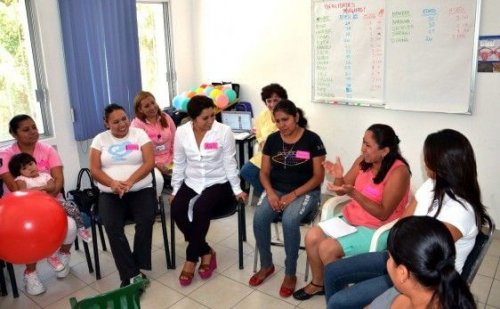Some 200 Million Women Don't Plan Motherhood

Family planning procedures have become known and legal for many years. However, more than 200 million women don’t plan motherhood. Why? Because they don’t have the means to do so. Like others, these women don’t wish to get pregnant. However, they don’t have the right resources. So, all they can do is resort to archaic methods such as leaving their husbands out of the house.
Modern contraception procedures aren’t yet accessible to women in developing countries. They survive with the use of methods that are actually ineffective, which is the main cause of overpopulation and other difficulties. Not being able to plan for motherhood can trigger a series of personal, social, and health complications.
There are many places where it’s not possible to decide how many children you want to have and when to have them. This is according to the report of the United Nations Fund for Population and Development, UNFPA. And this is something that’s become a survival problem because it implies various risks. Adolescent pregnancy, childbirth complications, induced abortion, the well-known obstetric fistula, among others, are the problems that these regions face for the same cause.
Failure to plan maternity is also a cause of maternal and infant mortality. Both mothers and children are victims of this endless cycle of unwanted pregnancies. And this is a situation that begins at an early age, because that’s the future of girls in many countries. According to UNFPA, some 222 million women don’t have access to sex education. And even fewer women have access to contraceptives.
They want to, but they don’t plan motherhood
So far, according to United Nations data, the fact that most of the affiliated countries have accepted the legalization of contraceptives hasn’t been enough. A greater commitment is still necessary regarding sexual education. In countries like Sierra Leone, only 8% of couples use modern contraceptive methods, which isn’t surprising. But in Guatemala, the statistic only rises to a meager 34%. This is a surprising figure, as it’s a more modernized country with very different customs.
Spain isn’t very advanced in this regard either. With 62%, they’re still very far from the 82% exhibited by Norwegian couples. The differences in these cases aren’t due to a different way of thinking. In fact, it’s something that all those couples who are outside of these percentages are also wanting to do something about it.

Planning motherhood’s a responsibility that couples have with themselves. Being able to delay the arrival of children or stop having them is essential in order for modern families to achieve other goals. However, the numbers are shocking regarding the lack of action regarding solving the problem of unwanted pregnancies.
In this sense, during the European Parliamentary Forum for Sexual & Reproductive Rights, EPF, the European Union brought up the need to improve sex education. A lack of proper sex education appears to be the main problem. Without access to contraceptive methods, the resolution of this issue is complicated. But for couples to decide to use them, they must first know about them and accept them.
Planning pays off
Teh United Nations sexual and reproductive health agency focuses on promoting the use of contraception. At the same time, other foundations aim to convince governments that it’s an investment that can save them millions. For every euro that the government invests in family planning, it saves six in health costs for abortion, mortality, morbidity, and maternity leave.

Medical advances in conceptual procedures have provided options for even the most skeptical individuals. Those devices that are perhaps more complex, expensive, or difficult to use devices tend to be the most effective for people with little contraceptive culture, ironically. For example, injectables or implants are effective for a longer period of time, so women don’t need to be as active with them.
In Spain, the deficiency in sex education beats other problems related to not planning. It’s true that at least 13 thousand adolescents terminate their pregnancies each year and another 1,300 give birth. This tells us that young people need more information and access to contraceptive methods, something that the government shouldn’t think twice about.
Although the reward for this investment is clear, the difference between countries is still very similar. In countries where there’s poverty, a deficiency in the health system, or complicated social arrangements, the low levels of planning are somewhat understandable. However, in developed countries, there’s no excuse for neglecting contraceptive practices.
Family planning procedures have become known and legal for many years. However, more than 200 million women don’t plan motherhood. Why? Because they don’t have the means to do so. Like others, these women don’t wish to get pregnant. However, they don’t have the right resources. So, all they can do is resort to archaic methods such as leaving their husbands out of the house.
Modern contraception procedures aren’t yet accessible to women in developing countries. They survive with the use of methods that are actually ineffective, which is the main cause of overpopulation and other difficulties. Not being able to plan for motherhood can trigger a series of personal, social, and health complications.
There are many places where it’s not possible to decide how many children you want to have and when to have them. This is according to the report of the United Nations Fund for Population and Development, UNFPA. And this is something that’s become a survival problem because it implies various risks. Adolescent pregnancy, childbirth complications, induced abortion, the well-known obstetric fistula, among others, are the problems that these regions face for the same cause.
Failure to plan maternity is also a cause of maternal and infant mortality. Both mothers and children are victims of this endless cycle of unwanted pregnancies. And this is a situation that begins at an early age, because that’s the future of girls in many countries. According to UNFPA, some 222 million women don’t have access to sex education. And even fewer women have access to contraceptives.
They want to, but they don’t plan motherhood
So far, according to United Nations data, the fact that most of the affiliated countries have accepted the legalization of contraceptives hasn’t been enough. A greater commitment is still necessary regarding sexual education. In countries like Sierra Leone, only 8% of couples use modern contraceptive methods, which isn’t surprising. But in Guatemala, the statistic only rises to a meager 34%. This is a surprising figure, as it’s a more modernized country with very different customs.
Spain isn’t very advanced in this regard either. With 62%, they’re still very far from the 82% exhibited by Norwegian couples. The differences in these cases aren’t due to a different way of thinking. In fact, it’s something that all those couples who are outside of these percentages are also wanting to do something about it.

Planning motherhood’s a responsibility that couples have with themselves. Being able to delay the arrival of children or stop having them is essential in order for modern families to achieve other goals. However, the numbers are shocking regarding the lack of action regarding solving the problem of unwanted pregnancies.
In this sense, during the European Parliamentary Forum for Sexual & Reproductive Rights, EPF, the European Union brought up the need to improve sex education. A lack of proper sex education appears to be the main problem. Without access to contraceptive methods, the resolution of this issue is complicated. But for couples to decide to use them, they must first know about them and accept them.
Planning pays off
Teh United Nations sexual and reproductive health agency focuses on promoting the use of contraception. At the same time, other foundations aim to convince governments that it’s an investment that can save them millions. For every euro that the government invests in family planning, it saves six in health costs for abortion, mortality, morbidity, and maternity leave.

Medical advances in conceptual procedures have provided options for even the most skeptical individuals. Those devices that are perhaps more complex, expensive, or difficult to use devices tend to be the most effective for people with little contraceptive culture, ironically. For example, injectables or implants are effective for a longer period of time, so women don’t need to be as active with them.
In Spain, the deficiency in sex education beats other problems related to not planning. It’s true that at least 13 thousand adolescents terminate their pregnancies each year and another 1,300 give birth. This tells us that young people need more information and access to contraceptive methods, something that the government shouldn’t think twice about.
Although the reward for this investment is clear, the difference between countries is still very similar. In countries where there’s poverty, a deficiency in the health system, or complicated social arrangements, the low levels of planning are somewhat understandable. However, in developed countries, there’s no excuse for neglecting contraceptive practices.
All cited sources were thoroughly reviewed by our team to ensure their quality, reliability, currency, and validity. The bibliography of this article was considered reliable and of academic or scientific accuracy.
- ONU. (2019). Doscientos millones de mujeres no pueden evitar el embarazo porque no tienen acceso a los anticonceptivos. Organización de las Naciones Unidas. https://news.un.org/es/story/2019/11/1465291
- Garcia-Esteve, L., Torres, A., Navarro, P., Aguado, J., & Ascaso, C. (2005). Maternidad no planificada y psicomorbilidad: Un riesgo evitable. Revista de Psiquiatría de la Facultad de Medicina de Barcelona. https://psycnet.apa.org/record/2005-14009-001
This text is provided for informational purposes only and does not replace consultation with a professional. If in doubt, consult your specialist.








